|
|
|
|
This year’s International Women’s Day, which falls on Monday, comes less than a week after one of the most heinous examples of misogyny and terrorism against women in Canada. A Toronto man was convicted of 10 counts of first-degree murder and 16 counts of attempted murder when he purposefully sought out female victims as he drove a van into crowds in 2018. The mass murderer was influenced by the online “incel movement” – another frightening way the internet is being used to spread hate against women.
The history of International Women’s Day goes all the way back to the first decade of the 20th century. A National Women’s Day was first held in the United States in 1909 to highlight unfair working conditions for women – and a call for voting rights. Within a few years, the movement had spread to Europe. But it wasn’t until 1975 that the United Nations marked the first International Women’s Day – an event that was “re-energized” at the beginning of the 21st century to address new challenges facing the women’s movement.
The theme for this year’s IWD is #ChooseToChallenge, a call for all of us to choose to seek out and celebrate women's achievements, raise awareness against bias and take action for equality.
At The Conversation Canada and La Conversation Canada, we track the gender of our authors. We were inspired to do this by the charity Informed Opinions, which has launched a #DiversifyYourSources campaign to recognize the need for Canadian media outlets to “hold themselves accountable to better represent a diversity of perspectives.” In 2020, 51 per cent of our authors were women.
And please allow me to celebrate the achievements of my wonderful colleagues at The Conversation Canada (Deputy Editor Hannah Hoag, Senior Culture + Society Editor and Director of Innovation Vinita Srivastava, Politics and Business Editor Lee-Anne Goodman, Health + Medicine Editor Patricia Nicholson, Science + Technology Editor Nehal El-Hadi, Arts and Education Editor Susannah Schmidt, Culture + Society Editor Haley Lewis, Audience Development Editor Lisa Varano and Assistant Audience Development Editor Anowa Quarcoo) and La Conversation Canada (Rédactrice en Chef Martine Turenne, Rédactrice en Chef Adjointe Kathy Noël and Gestionnaire d'Audience Viviane Agostino). I’m reminded every day how privileged I am to work with such a group of talented and dedicated journalists.
For your weekend reading, I’ve assembled some stories from across the global network of The Conversation that are especially relevant to International Women’s Day. And a reminder that the weekend is a great time to catch up on the latest episodes of our podcasts Don’t Call Me Resilient and The Conversation Weekly.
Have a great weekend and we’ll be back in your Inbox on Monday.
|
Scott White
CEO | Editor-in-Chief
|

|
|
International Women's Day: Weekend Reads
|
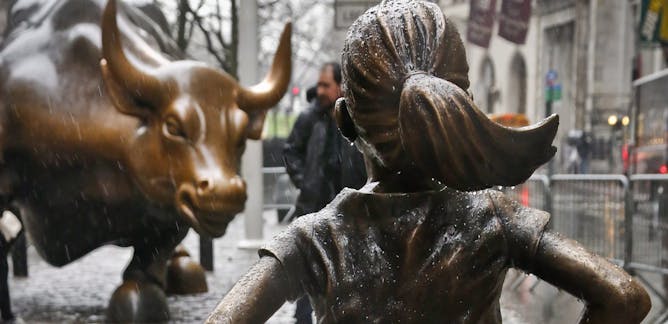
Mayurika Chakravorty, Carleton University
It's clear that when girls and young women are at the forefront of major social justice movements, the old structures of patriarchy and misogyny can be challenged and hopefully dismantled.
| |

Elizabeth McCallion, Queen's University, Ontario
In December 2020, the Senate became gender-equal, offering up the promise that women's interests will be represented in the upper chamber.
|
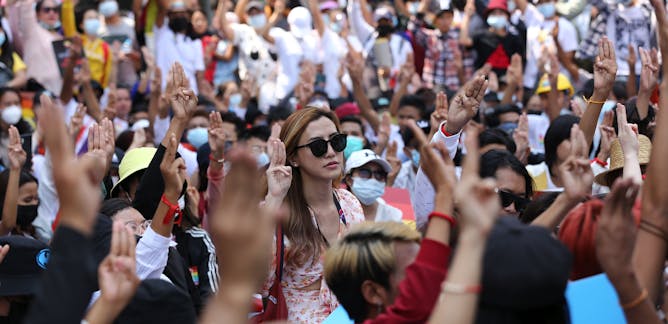
Gabrielle Bardall, L’Université d’Ottawa/University of Ottawa; Elin Bjarnegård, Netherlands Institute for Advanced Study
Despite having a woman leader, women are largely excluded from key positions of influence and leadership in Myanmar — a situation that helped the country's military succeed in its recent coup.
| |
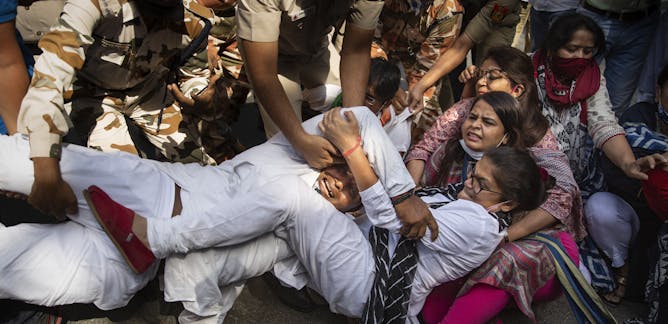
Deeplina Banerjee, Western University
Because of its extreme violence, the Hathras rape sent shock waves throughout India: it is a disturbing reminder of the normalization of rape culture there and should be seen as a call to action.
|

Jennifer Davis, University of British Columbia
The pandemic has negatively affected female and racialized faculty. Universities need to make sure their career advancement doesn't suffer.
| |
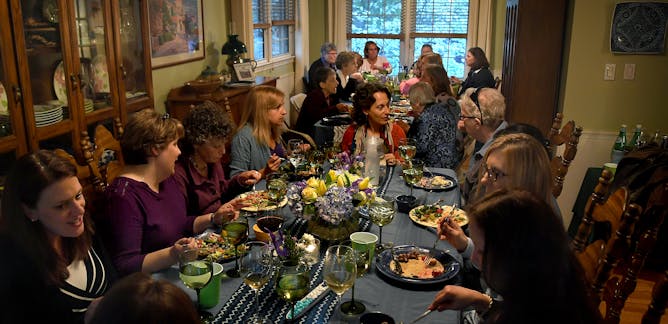
Tessa Skidmore, IUPUI; Charles Sellen, IUPUI
Whether they are single or married, giving as a group or on their own, women express their generosity in distinct ways.
|

Keith Cuthbertson, City, University of London
Female representation on FTSE 100 boards has risen from 12% to over 33% in a decade.
| |
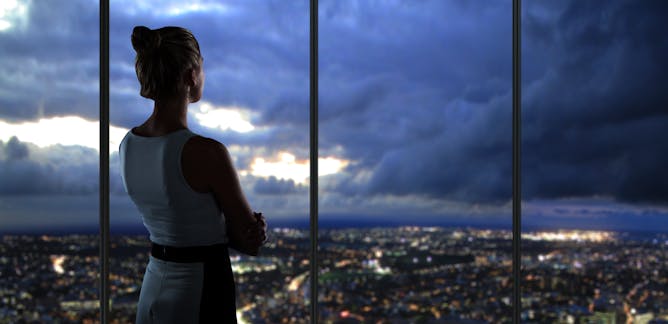
Isabel Fernandez-Mateo, London Business School; Sarah Kaplan, University of Toronto
At a time when corporations are struggling to address gender gaps at all levels, killing off stereotyped myths such as the Queen Bee Syndrome is essential.
|
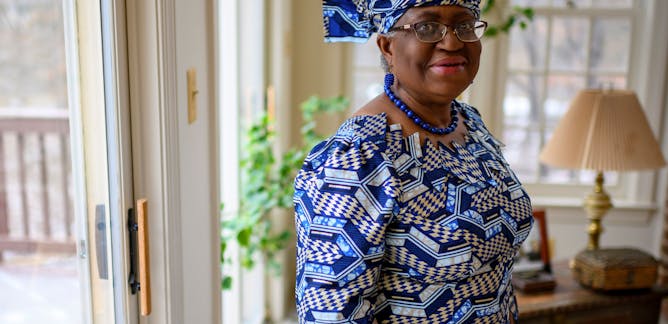
Monica Orisadare, Obafemi Awolowo University
Ngozi Okonjo-Iweala's appointment as the first woman and the first African director general of the World Trade Organisation is a win for women globally.
| |

Laken Brooks, University of Florida
Much of the iconography we associate with witches, from the pointy hat to the cauldron, originated from women working as master brewers.
|
|
|
Catch up on our podcasts
|
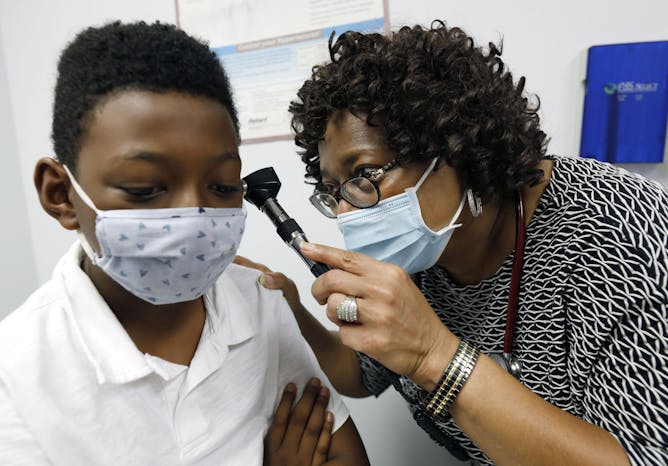
In this episode, Roberta Timothy talks about her new international health project, Black Health Matters, and explains why racial justice is a public health issue. In this photo, Dr. Janice Bacon, a primary care physician with Central Mississippi Health Services, gives Jeremiah Young, 11, a physical exam.
(AP Photo/Rogelio V. Solis)
Vinita Srivastava, The Conversation; Anowa Quarcoo, The Conversation; Ibrahim Daair, The Conversation
When COVID-19 first appeared, some called it the great equalizer. But the facts quickly revealed a grim reality: COVID-19 disproportionately impacts racialized communities.
|
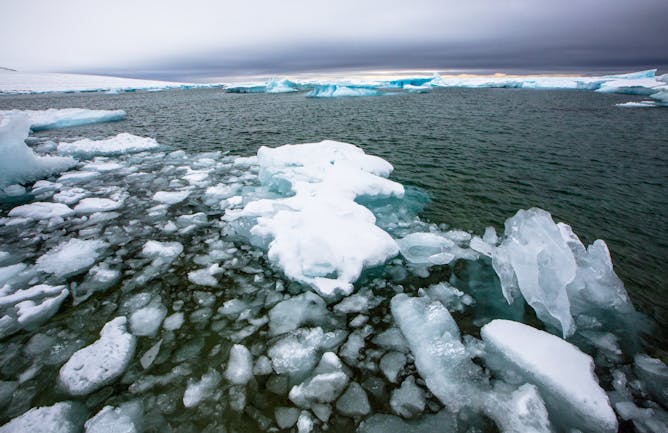
The Arctic is warming two to three times faster than any other place on Earth.
Kevin Xu Photography via Shutterstock
Gemma Ware, The Conversation; Daniel Merino, The Conversation
Plus, new discoveries about early humans in Tanzania's Olduvai Gorge. Listen to episode 5 of The Conversation Weekly podcast.
|
| |
| |
| |
| |

|
| |
| |
| |
| |
| |
| |
| |
| |
|
|
|
|
|
|
|